原文链接: https://leetcode-cn.com/problems/check-if-word-can-be-placed-in-crossword
英文原文
You are given an m x n matrix board, representing the current state of a crossword puzzle. The crossword contains lowercase English letters (from solved words), ' ' to represent any empty cells, and '#' to represent any blocked cells.
A word can be placed horizontally (left to right or right to left) or vertically (top to bottom or bottom to top) in the board if:
- It does not occupy a cell containing the character
'#'. - The cell each letter is placed in must either be
' '(empty) or match the letter already on theboard. - There must not be any empty cells
' 'or other lowercase letters directly left or right of the word if the word was placed horizontally. - There must not be any empty cells
' 'or other lowercase letters directly above or below the word if the word was placed vertically.
Given a string word, return true if word can be placed in board, or false otherwise.
Example 1:
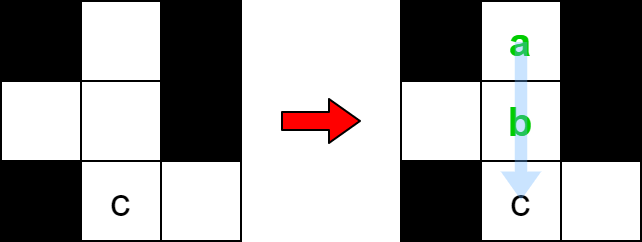
Input: board = [["#", " ", "#"], [" ", " ", "#"], ["#", "c", " "]], word = "abc" Output: true Explanation: The word "abc" can be placed as shown above (top to bottom).
Example 2:
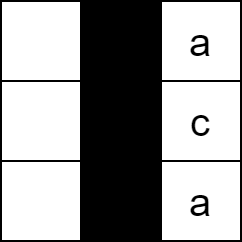
Input: board = [[" ", "#", "a"], [" ", "#", "c"], [" ", "#", "a"]], word = "ac" Output: false Explanation: It is impossible to place the word because there will always be a space/letter above or below it.
Example 3:
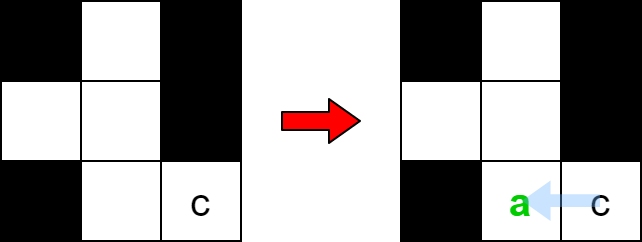
Input: board = [["#", " ", "#"], [" ", " ", "#"], ["#", " ", "c"]], word = "ca" Output: true Explanation: The word "ca" can be placed as shown above (right to left).
Constraints:
m == board.lengthn == board[i].length1 <= m * n <= 2 * 105board[i][j]will be' ','#', or a lowercase English letter.1 <= word.length <= max(m, n)wordwill contain only lowercase English letters.
中文题目
给你一个 m x n 的矩阵 board ,它代表一个填字游戏 当前 的状态。填字游戏格子中包含小写英文字母(已填入的单词),表示 空 格的 ' ' 和表示 障碍 格子的 '#' 。
如果满足以下条件,那么我们可以 水平 (从左到右 或者 从右到左)或 竖直 (从上到下 或者 从下到上)填入一个单词:
- 该单词不占据任何
'#'对应的格子。 - 每个字母对应的格子要么是
' '(空格)要么与board中已有字母 匹配 。 - 如果单词是 水平 放置的,那么该单词左边和右边 相邻 格子不能为
' '或小写英文字母。 - 如果单词是 竖直 放置的,那么该单词上边和下边 相邻 格子不能为
' '或小写英文字母。
给你一个字符串 word ,如果 word 可以被放入 board 中,请你返回 true ,否则请返回 false 。
示例 1:
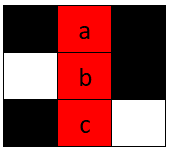
输入:board = [["#", " ", "#"], [" ", " ", "#"], ["#", "c", " "]], word = "abc" 输出:true 解释:单词 "abc" 可以如上图放置(从上往下)。
示例 2:

输入:board = [[" ", "#", "a"], [" ", "#", "c"], [" ", "#", "a"]], word = "ac" 输出:false 解释:无法放置单词,因为放置该单词后上方或者下方相邻格会有空格。
示例 3:
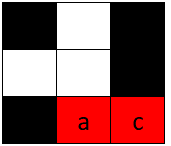
输入:board = [["#", " ", "#"], [" ", " ", "#"], ["#", " ", "c"]], word = "ca" 输出:true 解释:单词 "ca" 可以如上图放置(从右到左)。
提示:
m == board.lengthn == board[i].length1 <= m * n <= 2 * 105board[i][j]可能为' ','#'或者一个小写英文字母。1 <= word.length <= max(m, n)word只包含小写英文字母。
通过代码
高赞题解
遍历每一行和每一列,将两个 $\texttt$),我们要做的就是遍历(正序+倒序)每个槽位,判断 $\textit{word}$ 能否恰好填入该槽位。
时间复杂度:$O(nm)$。注意最内层循环与第二层循环共用同一个下标变量。
空间复杂度:$O(1)$。只需要常数的空间存放若干变量。
func placeWordInCrossword(board [][]byte, word string) bool {
m, n, k := len(board), len(board[0]), len(word)
// 遍历行
for _, row := range board {
for j := 0; j < n; j++ {
if row[j] == '#' {
continue
}
// 遍历并匹配两个 # 之间的字符
j0, ok1, ok2 := j, true, true
for ; j < n && row[j] != '#'; j++ { // 注意这里的 j 就是外层循环的 j,因此整体复杂度是线性的
if j-j0 >= k || row[j] != ' ' && row[j] != word[j-j0] { // 正序匹配 word
ok1 = false
}
if j-j0 >= k || row[j] != ' ' && row[j] != word[k-1-j+j0] { // 倒序匹配 word
ok2 = false
}
}
if (ok1 || ok2) && j-j0 == k { // 只要正序和倒序中有一个匹配成功,且两个 # 之间的字符长度恰好为 word 的长度,就返回 true
return true
}
}
}
// 遍历列(同上)
for j := 0; j < n; j++ {
for i := 0; i < m; i++ {
if board[i][j] == '#' {
continue
}
i0, ok1, ok2 := i, true, true
for ; i < m && board[i][j] != '#'; i++ {
if i-i0 >= k || board[i][j] != ' ' && board[i][j] != word[i-i0] {
ok1 = false
}
if i-i0 >= k || board[i][j] != ' ' && board[i][j] != word[k-1-i+i0] {
ok2 = false
}
}
if (ok1 || ok2) && i-i0 == k {
return true
}
}
}
return false
}统计信息
| 通过次数 | 提交次数 | AC比率 |
|---|---|---|
| 2086 | 5087 | 41.0% |
提交历史
| 提交时间 | 提交结果 | 执行时间 | 内存消耗 | 语言 |
|---|




